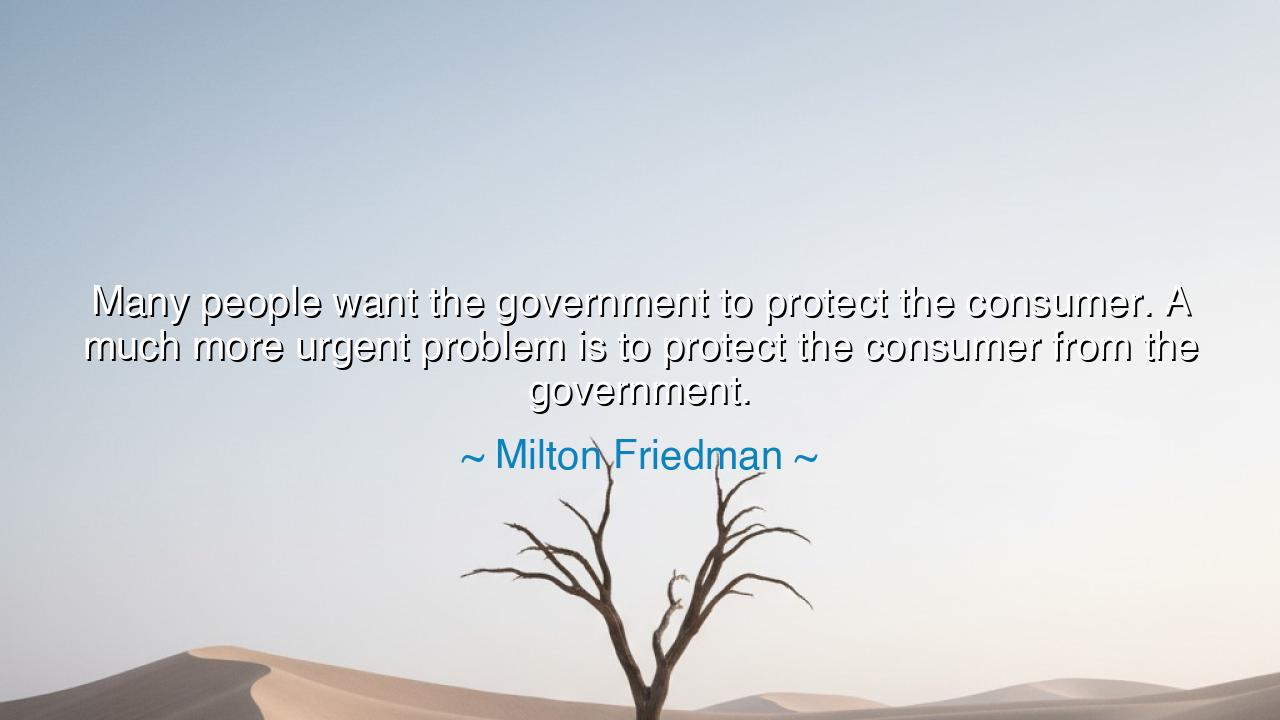
Many people want the government to protect the consumer. A much
Many people want the government to protect the consumer. A much more urgent problem is to protect the consumer from the government.






The words of Milton Friedman, the great economist and defender of liberty, burn with the calm fire of eternal truth: “Many people want the government to protect the consumer. A much more urgent problem is to protect the consumer from the government.” In these few lines, Friedman unmasks a paradox at the heart of modern society. The people, fearing exploitation from corporations and merchants, turn instinctively to the state for rescue—never realizing that the very force they invite to save them may one day enslave them. His words are a warning, carved in wisdom: that power, once given to protect, seldom resists the temptation to control.
Friedman spoke during an age when governments were expanding their reach into every corner of economic life. Born from good intentions—the desire to ensure fairness, safety, and equality—this expansion nonetheless carried a hidden danger. For every law that promises protection, another law follows that limits choice. For every rule written to defend the weak, another arises that binds the free. Friedman’s insight cuts through this illusion: the greatest threat to the consumer is not the merchant who overcharges, but the state that overreaches. When the government becomes the supreme arbiter of what people may buy, sell, or use, it does not defend the consumer—it replaces him.
History bears heavy witness to this truth. In the Soviet Union, the government promised to protect its citizens from greedy capitalists and to ensure that every worker received his fair share. The result was catastrophe: empty shelves, starving families, and a people stripped of dignity and choice. The government, claiming to act for the consumer, became his master. Factories produced goods not to satisfy the people, but to fulfill state quotas. The people were told what they could eat, what they could wear, even what they could believe. The protection of the consumer became the destruction of the individual. Friedman, observing such systems from the free world, understood that once the government assumes control over economic freedom, moral and personal freedom soon follow into captivity.
But his warning was not directed only at tyrannies abroad—it was a message to the democracies of the West. He saw that freedom erodes not through sudden conquest, but through gradual consent. Each new regulation, each noble attempt to "protect the public," adds another thread to the web of dependency. Citizens, lulled by the illusion of safety, forget how to stand on their own. And so, the consumer—once sovereign, once powerful through his choices—becomes a subject. Friedman knew that markets, though imperfect, are the greatest reflection of individual will. To interfere too much is to silence that will, and to replace it with the will of bureaucrats who claim to know better.
The wisdom of the ancients echoes this truth in another form: beware the protector who asks for your chains in exchange for peace. Every empire that has fallen into decay has done so in the name of “public good.” Rome itself, once the cradle of liberty, grew soft under the weight of government handouts and central control. The citizens who had once been fierce and free became passive and dependent, content to be fed rather than to create. The government that promised to care for them became their ruler in every sense. Freedom died not with rebellion, but with gratitude.
Friedman’s words challenge not only governments but also the hearts of men. He teaches that liberty demands courage—the courage to make one’s own choices, to bear risk, and to live with consequence. It is easier to ask for protection than to practice independence; easier to surrender control than to govern oneself. Yet the consumer, the citizen, the individual—these are not children to be guided, but free souls to be trusted. A people cannot remain free if they expect the state to shield them from every discomfort. For when the government begins to protect you from your own decisions, it also begins to own your destiny.
The lesson, then, is eternal and urgent: protect yourself from overprotection. Demand transparency from rulers, but not guardianship. Seek justice, but not paternalism. Support laws that punish fraud, but resist those that dictate your freedom to choose. Remember that every freedom surrendered for safety is a seed of future tyranny. Let the spirit of discernment be your guide—not fear, not dependency. For the power to choose—what to buy, what to believe, how to live—is the essence of freedom itself.
Thus, let Friedman’s wisdom be passed down as a torch for all generations: the government’s proper role is to serve, not to save; to safeguard, not to shepherd. A strong people must learn to trust their own judgment more than the judgment of officials. The surest defense of the consumer lies not in the halls of bureaucracy, but in the courage of a free mind. And when men remember this—when they reclaim responsibility for their own lives—then the balance between liberty and power is restored, and the chains of benevolent tyranny are broken forever.






AAdministratorAdministrator
Welcome, honored guests. Please leave a comment, we will respond soon